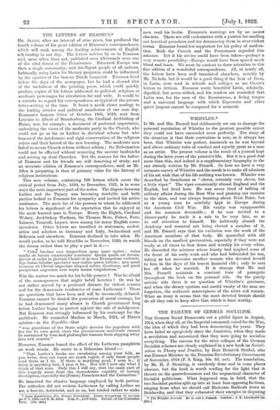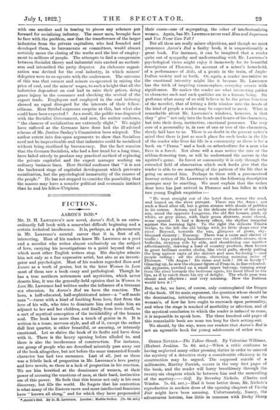Itti; FAILURE OF GERMAN SOCIALISM.
Tun German Social Democrats cut a pitiful figure in August, 1914, when they all, at the Imperial command, voted for the War, the idea of which they had been denouncing for years. They have failed as egregiously since the Armistice, when they made a revolution and announced that they were going to socialize everything. The reasons for the utter collapse of the German Socialist schemes are clearly explained in a new book on Sociali- zation in Theory and Practice, by Herr Heinrich Strobel, who was Finance Minister in the Prussian Revolutionary Government of November, 1918 (P. S. King, 10s. 6d. net). The translation, by Mr. H. J. Stenning, is carelessly done and in some places obscure, but the book is worth reading for the light that it throws on the quarrelsomeness and the unpractical character of Socialist politicians. What happened was, in brief, that the two Socialist parties split up into at least four opposing factions, ranging from what we should call Moderate Radicals down to Bolsheviks, and that they exhausted their energies in disputing • The Whistler Journal. BY B. and J, Pennell. Loudon : J. B. Lippincott Co, with one another and in tearing to pieces any schemes put forward for socializing industry. The saner men, brought face to face with the problem, saw that the transference of the larger industries from the private capitalists, who had founded and developed them, to bureaucrats or committees, would almost certainly mean the closing of the works and the loss of employ- ment to millions of people. The attempts to find a compromise between Socialist theory and industrial ruin excited no enthusi- asm and intensified the party disputes. An elaborate organi- zation was devised for the coal industry, in which miners' delegates were to co-operate with the coalowners. The outcome of this was that owners and miners co-operated in raising the price of coal, and the miners' wages, to such a height that all the industries dependent on coal had to raise their prices, doing grave injury to the consumer and checking the revival of the export trade. Employers and employed in the coal industry showed an equal disregard for the interests of their fellow- citizens. Herr Strobel expresses surprise at this, but what else could have been expected ? As a result, the public was disgusted with the Socialist Government, and now, the author confesses, " the chances of socialization are extremely slight." We might have suffered as the Germans have done had the ill-advised scheme of Mr. Justice Sankey's Commission been adopted. The author enters into fine-spun arguments to show that Socialism need not be impracticable and that industries could be socialized without being sterilized by bureaucracy. But the fact remains that the German Socialists, who had a free hand for a long time, have failed utterly to produce any practical method of replacing the private capitalist and the expert manager working on ordinary business lines. Herr Strobel confesses that " it is not the backward stage of capitalist development which prevents socialization, but the psychological immaturity of the masses of the people." He has not stopped to consider the possibility that the masses may have a sounder political and economic instinct than he and his fellow-Utopians.











































 Previous page
Previous page